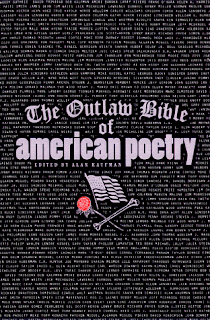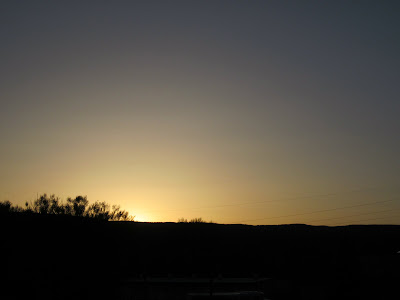A Book I Want: The Outlaw Bible of American Poetry
When I was in high school, I was part of the Forensics team. (Not the crime-solving, fingerprint-collecting kind, the drama and presentation kind.) My category was poetry, meaning whenever we had competitions, I would get up before a group of people and read my selected poetry outloud before peers and judges.
Junior year was my best in Forensics, when I read the poem "Ball and Chain Record Store" by Ellyn Maybe. In the poem, the main character ends up calling her boss a pig, wreaking havoc on the store, and waltzing out to the beat of a drum nobody's playing. I went to the state competition in Madison each year I participated, but junior year was when I received a perfect score and a gold medal - not an easy feat. But I'm sure half my success is owed to the poem I chose. (The other half goes to my coach.)
I found that poem in The American Bible of Outlaw Poetry, edited by Alan Kaufman.
A copy showed up at work the other day, and it's sent me into a fantastic nostalgia spiral: remembering all that time I spent practicing, the crazy fun with fellow Forensicators, the odd experiences on bus trips. For that reason (among others), I really want to get this book.
The Outlaw Bible features a ton of amazing poets - the book is about three inches thick, after all, so I would hope that's the case. According to various reviews (some of them snottier than others), not everything in this book is a gold mine. Some poems just aren't that great; some speak to a purpose that no one but the author could hope to ferret out. Then there's the discussion of whether anything in this book is actually "outlawed," but that's a bit nitpicky, I think. After all, poets use lots of metaphor.
But the purpose of this book, according to Kaufman, was to expose readers to things one doesn't often run across - hence the absence of Ginsberg's "Howl" and anything by Bukowski. Instead, writers like Ellyn Maybe and Patricia Smith shout their unsettled hearts out in these pages. It's a mind-opener, a non-conformist mantra, and an explosion of unrest toward all that's wrong with the world.
In other words, it's my bible.
Junior year was my best in Forensics, when I read the poem "Ball and Chain Record Store" by Ellyn Maybe. In the poem, the main character ends up calling her boss a pig, wreaking havoc on the store, and waltzing out to the beat of a drum nobody's playing. I went to the state competition in Madison each year I participated, but junior year was when I received a perfect score and a gold medal - not an easy feat. But I'm sure half my success is owed to the poem I chose. (The other half goes to my coach.)
I found that poem in The American Bible of Outlaw Poetry, edited by Alan Kaufman.
A copy showed up at work the other day, and it's sent me into a fantastic nostalgia spiral: remembering all that time I spent practicing, the crazy fun with fellow Forensicators, the odd experiences on bus trips. For that reason (among others), I really want to get this book.
The Outlaw Bible features a ton of amazing poets - the book is about three inches thick, after all, so I would hope that's the case. According to various reviews (some of them snottier than others), not everything in this book is a gold mine. Some poems just aren't that great; some speak to a purpose that no one but the author could hope to ferret out. Then there's the discussion of whether anything in this book is actually "outlawed," but that's a bit nitpicky, I think. After all, poets use lots of metaphor.
But the purpose of this book, according to Kaufman, was to expose readers to things one doesn't often run across - hence the absence of Ginsberg's "Howl" and anything by Bukowski. Instead, writers like Ellyn Maybe and Patricia Smith shout their unsettled hearts out in these pages. It's a mind-opener, a non-conformist mantra, and an explosion of unrest toward all that's wrong with the world.
In other words, it's my bible.




Comments
Post a Comment